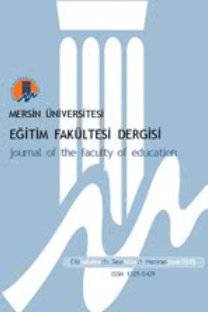Türkiye’deki Ebeveynlerin Çocuklarının İnternet ve Sosyal Paylaşım Siteleri Kullanımına Yönelik Bilgi Seviyeleri ve Algıları
Günümüzde, ebeveynlerin, güvenli ve bilinçli İnternet ve sosyal paylaşım siteleri kullanımındabilinçlendirilmesi ve çocuklarına rehberlik etmesi büyük önem taşımaktadır. Bu amaç doğrultusunda,ilköğretim okulu öğrencilerinin ebeveynlerini bilinçlendirmeye yönelik “Bilgi Toplumunda Aile” seminerleriverilmiştir. Bu çalışma, seminere katılan ebeveynlerin bilgisayar, İnternet ve sosyal paylaşım sitelerikullanımına yönelik algı ve bilgi seviyelerini betimlemeyi amaçlamaktadır. Araştırmanın çalışma grubunuAnkara’nın farklı bölgelerindeki okullarda çocukları ilköğretim öğrencisi olan 40 ebeveyn oluşturmaktadır.Ebeveynlerin, çocuklarının İnternet ve sosyal paylaşım sitelerini kullanımları ile ilgili algı ve bilgiseviyelerini belirlemek için ebeveynlerden seminer öncesinde anket yoluyla veri toplanmış ve betimleyicianaliz yöntemi ile incelenmiştir. Anket sonuçları, ebeveynlerin çoğunlukla çocuklarının bilgisayar ve İnternetkullanımı konusunda rehberlik etmeye yönelik isteklerinin olması yanında, bilgi ve farkındalık konusundayeterli olmadıklarını göstermiştir. Bulgular, alan yazındaki çalışmaları destekleyen nitelikte olup, bilinçli veverimli Internet ve sosyal paylaşım siteleri kullanımı konusunda ebeveynlerin bilgilendirilmesi vebilinçlendirilmesi gerekliliğini ortaya koymuştur.
Anahtar Kelimeler:
İnternet güvenliği, sosyal paylaşım siteleri, ilköğretim öğrencileri, ve ebeveynler
-
Parents’ Knowledge Levels and Perceptions about Their Children’s Use of Internet and Social Networking Sites. Nowadays, safe and conscious awareness of parents’ in using Internet and social networking sites to guide their children is important. For this purpose, Families in the Information Society (FIS) seminars were hold for the parents whose children are primary school students in order to raise the awareness of parents. This study aims to describe the perceptions and knowledge levels of parents, who attended the FIS seminars, towards computer, Internet and social networking sites. The sample of the study included 40 parents whose children are students at primary schools in different regions of Ankara. In order to describe parents’ perceptions and knowledge levels related to their children’s usage of Internet and social networking sites, data were collected through a survey before the seminars and analyzed with descriptive analysis method. The results of the study showed that, although parents are interested in guiding their children computer and Internet usage, their knowledge and awareness are not sufficient. The findings support the studies in the literature that there is a need to inform and raise the awareness of parents about conscious and efficient Internet and social networking sites.
Keywords:
Internet safety, social networking sites, K12, and parents,
___
- Berrier, T. (2007). Sixth-, seventh-, and eighth-grade students' experiences with the Internet and their Internet safety knowledge. Dissertation Abstracts International, (UMI No. 3292621).
- Berson, M. J. (2000). The computer can't see you blush. Kappa Delta Pi Record, 36, 158-162.
- Blackwell, G. (2003). Internet safety: In harm’s way. Today’s Parent. Retrieved 10.02.12 from http://www.todaysparent.com/preteen/healthsafety/article.jsp?content=20030606_160536_1328an dpa
- Bross, D. C. (2005). Minimizing risks to children when they access the world wide web. Child Abuse & Neglect, 29, 749-752.
- Eberhardt, D. M. (2007). Facing up to Facebook. Wiley InterScience. Retrieved 10.02.12 from http://onlinelibrary.wiley.com.
- Hopper-Losenicky, K. (2010). Risk communication in the Internet age: Parental challenges in monitoring the Internet use of adolescants. Dissertation Abstracts International, (UMI No. 1487984). İ nternet Kurulu, Telekomünikasyon İletişim Başkanlığı, & Orta Doğu Teknik Üniversitesi. (Şubat 2011). Çocukların sosyal paylaşım sitelerini kullanım alışkanlıkları araştırması raporu. Retrieved 012 from http://www.guvenliweb.org.tr/istatistikler/node/43. İ nternet World Stats (2012). Internet and facebook usage in Europe. Retrieved 10.02.12 from http://www.internetworldstats.com/stats4.htm.
- Livingstone, S. & Brake, D. R. (2009). On the rapid rise of social networking sites: New findings and policy implications. Children & Society, 24, 75-83.
- Livingstone, S., Haddon, L., Görzig, A., and Ólafsson, K. (2011). Risks and safety on the İnternet: The perspective of European children. LSE, London: EU Kids Online. Retreived 10.12.12 from http://www2.lse.ac.uk/media@lse/research/EUKidsOnline/EUKidsII%20(200911)/ParticipatingCountries/UKReport.pdf.
- Livingstone, S., & Helsper, E. (2010). Balancing opportunities and risks in teenagers’ use of the Internet: The role of online skills and Internet self-efficacy. New Media & Society, 12(2), 309-329. Lou, S., Shih, R., Liu, H., Guo, Y., & Tseng, K. (2010). The influences of the sith graders’ parents’ Internet literacy and parenting style on Internet parenting. TOJET, 9(4), 173-184.
- Mitchell, K. (2010). Remaining safe and avoiding dangers online: A social media Q&A with Kimberly Mitchell. The Prevention Researcher, 17, 7-9.
- Olagunju, A. O. (2008). Harmonizing the interests of free speech, obscenity and child pornography on cyberspace: The new roles of parents, technology and legislation for Internet safety. Retrieved 12 from http://www.eric.ed.gov/PDFS/ED502269.pdf.
- Rosen, L. D., Cheever, N. A., & Carrier, L. M. (2008). The association of parenting style and child age with parental limit setting and adelescent MySpace behavior. Journal of Applied Developmental Psychology, 29, 459-471.
- Yayın Aralığı: Yılda 3 Sayı
- Başlangıç: 2005
- Yayıncı: Mersin Üniversitesi Eğitim Fakültesi
Sayıdaki Diğer Makaleler
Saniye TOKEL, Derya BAŞER, Veysi İŞLER
Öğretmen Adaylarının Bilgisayar Kullanımına Yönelik Öz-yeterlik İnançları
Betül TİMUR, Şirin YILMAZ, Serdar TİMUR
Öğretmen Adaylarının Öğretmen Kavramına İlişkin Algıları: Bir Metaforik Çalışma
Fatih YILMAZ, Selin GÖÇEN, Ferat YILMAZ
Sosyal Güvende Hissetme ve Memnuniyet Ölçeğinin Türkçe Formunun Geçerlik ve Güvenirlik Çalışması
Ahmet AKIN, Recep UYSAL, Nihan ÇİTEMEL
Üretim İlişkileri Bağlamında La Fontaine Masallarında Değer Sorgulaması
Proje Tabanlı Öğrenme Yönteminin Web Tasarımı Dersinde Kullanılmasına İlişkin Nitel Bir Çalışma
